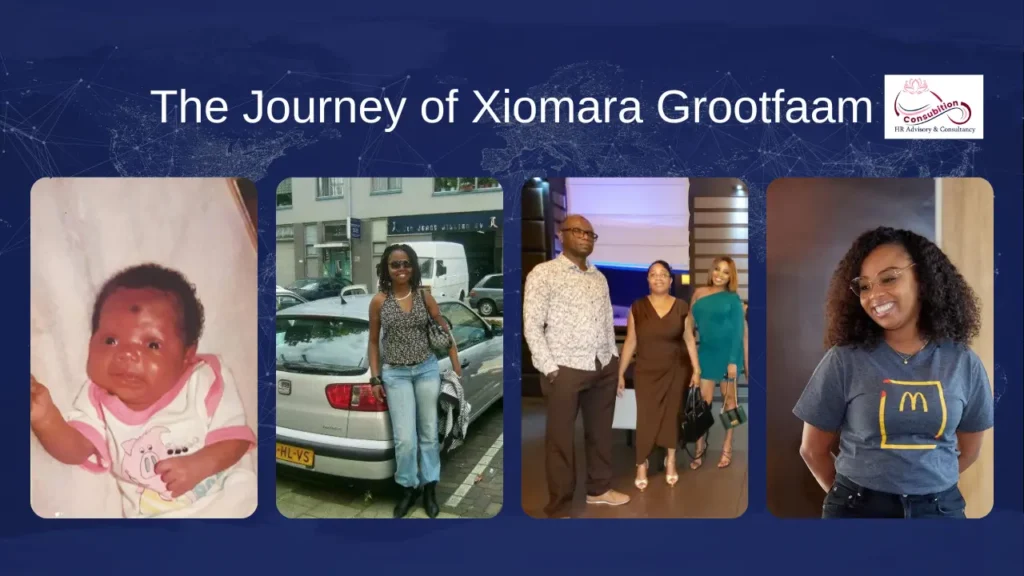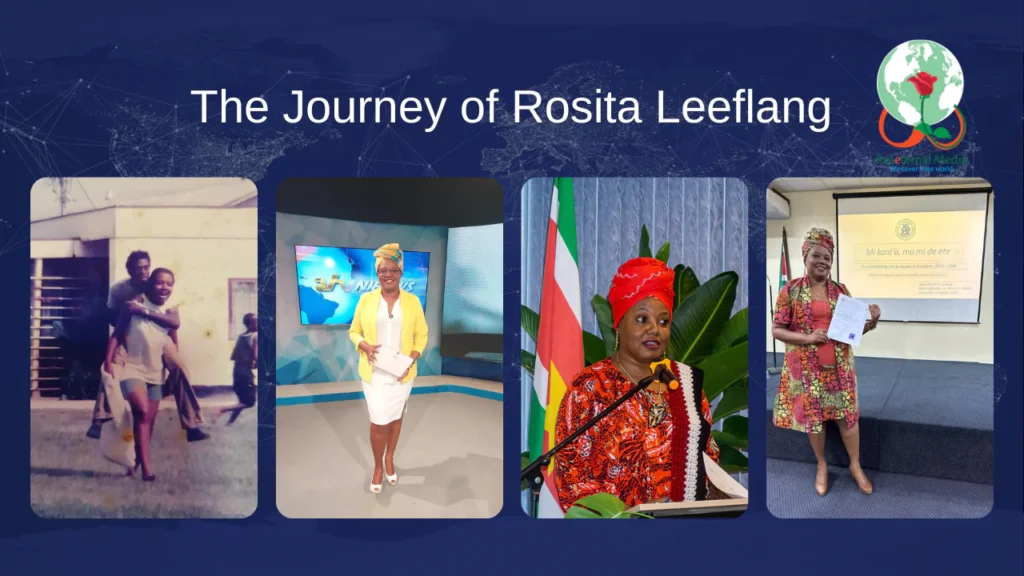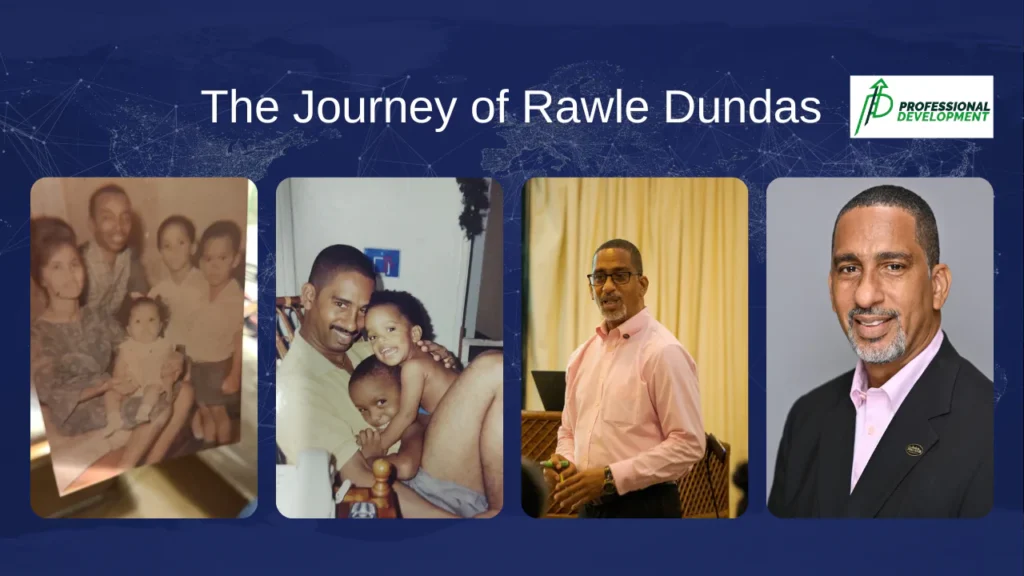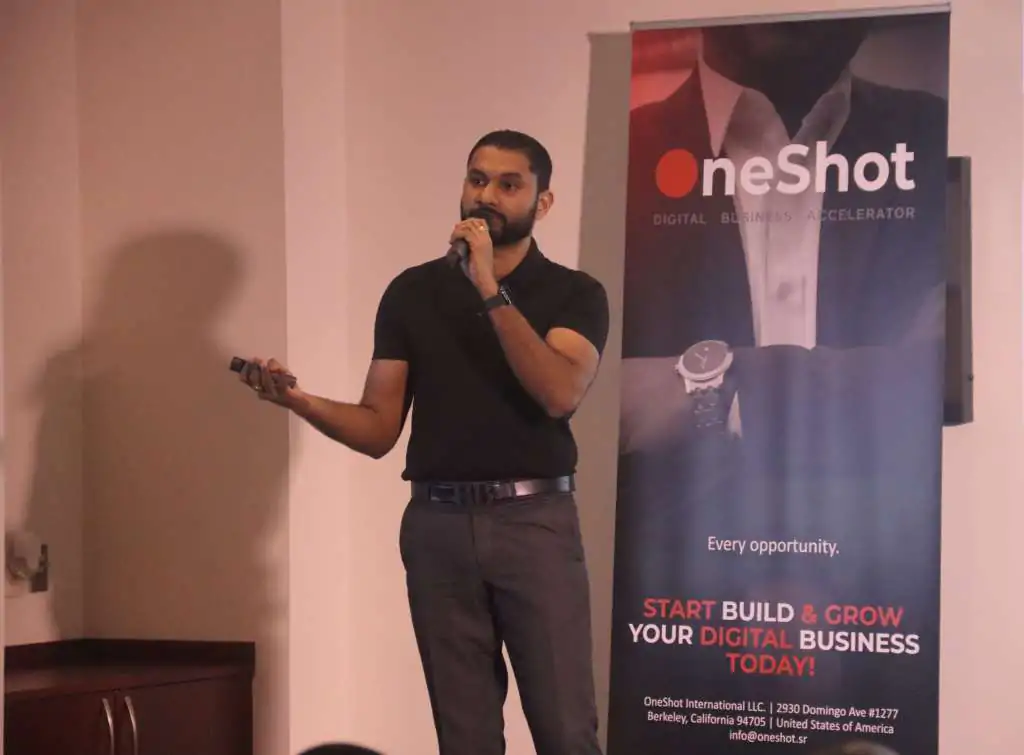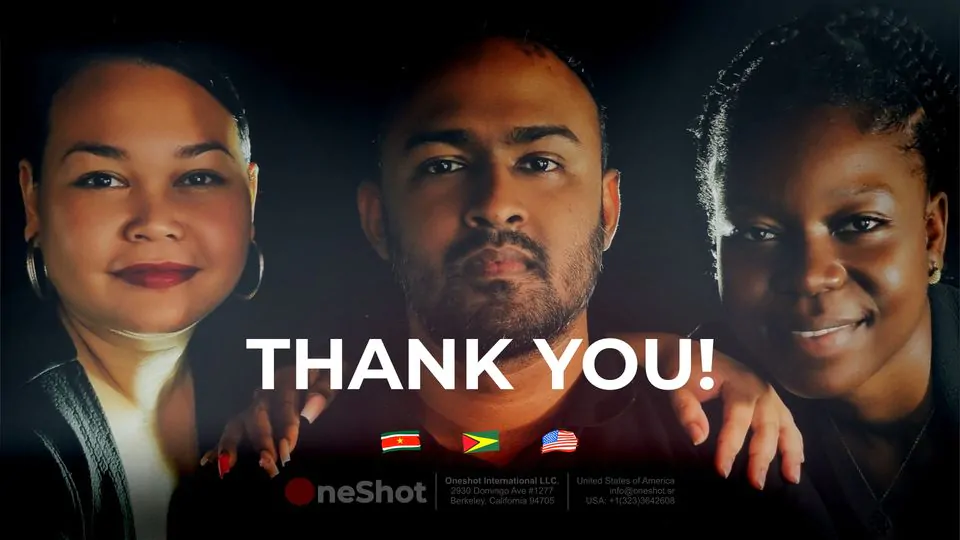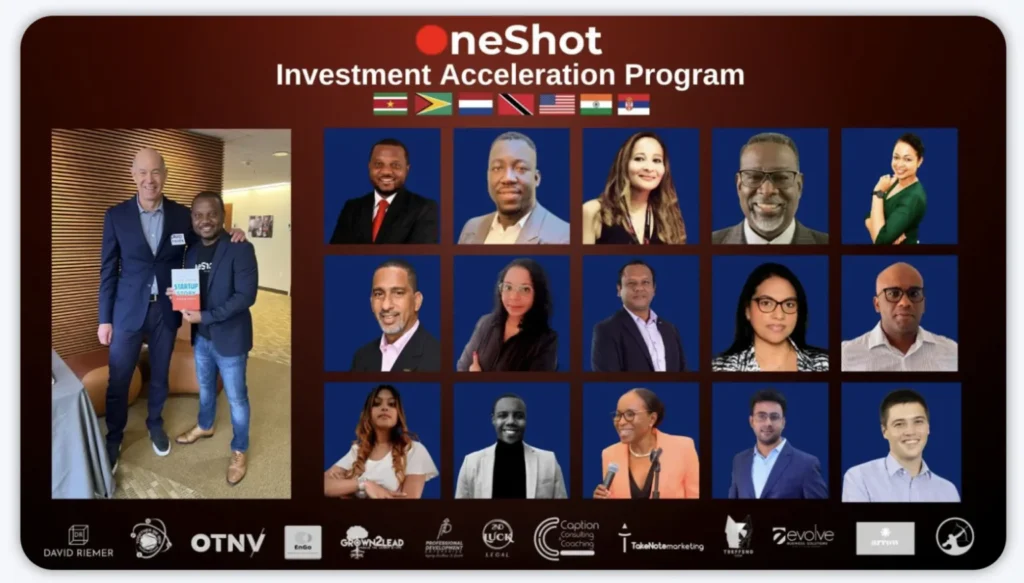[Entrepreneurs Impact 16] Journey Xiomara Grootfaam
Childhood of Xiomara Grootfaam Think like a queen. A queen is not afraid to fail. Failure is another stepping stone to greatness. – Oprah Winfrey Xiomara was born on August 25, 1990, in Paramaribo, Suriname, to Joan Sanses and Carlo Grootfaam. She has one brother, Moreo Grootfaam. One of her favorite quotes is from Oprah Winfrey: “Think like a queen. A queen is not afraid to fail. Failure is another stepping stone to greatness.” Xiomara adds her perspective to this quote, saying “Never a failure, always a lesson.” Oprah Winfrey is one of her role models, particularly inspiring due to her journey from humble beginnings to remarkable success. Xiomara had a joyful and nurturing childhood, with ample opportunities for self-discovery and personal expression. Growing up with her brother, Moreo, was lively and educational, as he instilled in her the importance of speaking up and advocating for herself. Although they often clashed due to their contrasting personalities—Moreo’s stubbornness versus Xiomara’s assertiveness—their relationship was filled with playfulness, such as recreating stunts from Nintendo games in real life. During her youth, Xiomara was actively involved in various activities that shaped her character. She participated in the Boy Scouts, where she learned discipline and strength. Additionally, she played volleyball for 11 years with the Volleyball Association Yelyco. Xiomara demonstrated her commitment and loyalty by keeping her commitment to her associations Through the Boy Scouts, she underwent lifeguard training and was even selected to participate in a swimming marathon after rigorous training spanning six months. However, she faced a setback when a medical test revealed low iron levels, disqualifying her from the marathon despite her dedication. Xiomara’s academic journey commenced at Julius Lobato School, followed by E.B.G. MULO Ritfeld School, and she continued her education at Mr. Dr. J C de Miranda Lyceum, also known as Lyceum. Subsequently, she pursued studies at the Anton de Kom University of Suriname, majoring in Public Administration, and completed her Master’s Degree in Human Resource Management at the FHR Institute for Higher Education within the nominal time. Her academic achievements reflect her determination and focus on success. Her Impact Xiomara’s professional journey began with a summer job at a well-known commercial bank in Suriname, Hakrinbank. She valued this temporary role as a significant opportunity, considering the skills she acquired, which she believed were applicable in various settings. The diverse experiences and skills she gained made her eager to return to work during breaks. She then transitioned to a sales role at a Digicel Shop and later worked as a Call Agent at Telenamic, focusing on developing essential soft skills such as patience, stress management, teamwork, and conflict resolution. Afterward, Xiomara served as a Public Relations Officer at the NGO Stichting Liefdevolle Handen, which supports women facing socio-economic challenges. Here, she had direct access to her research demographic for her thesis at Anton de Kom University. Her responsibilities included policy writing for public relations and leading a team. Despite the economic crisis of 2015, she persisted in her career aspirations, enduring three months without pay. Following a period of unemployment, during which she pursued hair braiding as a side business, Xiomara joined Republic Bank through a Christmas Project initiative, leveraging this opportunity to showcase her capabilities and negotiate a contract position. At the time, banks collaborated with staffing agencies, resulting in her initial one-year contract. Xiomara strongly criticizes the treatment of temporary employees, equating their conditions to modern slavery, given their equivalent workloads for significantly reduced pay. Despite her adaptability across departments at RB Bank, her efforts were not reflected in her earnings. Later, Xiomara returned to Hakrinbank as a temporary employee, initially earning less than her previous role. However, advocacy for better conditions led to improved compensation, doubling her earnings from Republic Bank. At Hakrinbank, she worked in the Credit Department while concurrently pursuing her Master’s degree, which emphasized practical applications. For a certain period of time s also worked at a group of companies in Commewijne where she excelled as a Human Resource Officer until the company’s closure, leaving her unemployed for several months. Following this, she briefly taught at FHR and now serves as the Human Resource Manager at McDonald’s in Suriname. Additionally, she lectured at the FHR School of Business, specializing in Professional Development, Project Management, Competence Development, and Internship Supervision. Xiomara never gets away from challenges. Even when it’s not directly in her field, she embraces them because she believes in the value of being broadly skilled and versatile. Do you believe in coincidence? From her final year of high school, Xiomara was determined to study Children’s Rights. During that time, the term HRM had just been introduced in Suriname, sparking her interest despite her initial uncertainty about its meaning. In the same year, she attended a Youth Information Fair to explore post-secondary options. It was there that she learned about opportunities from the University (then known as the Hogeschool in Holland, now FHR). The information she received from FHR immediately captured her interest. The university offered HRM as part of the Public Administration program. However, the classes at the Hogeschool were held in the evenings, conflicting with her sports commitments. Despite this, Xiomara was drawn to Hogeschool in Holland because she believed that an international diploma would open doors globally. After discussing with her parents and carefully considering her options, she enrolled in Public Administration at Anton de Kom University of Suriname. Over time, she grew to enjoy the program, despite the realization that HRM was just one subject within it and not a specialization. She completed her studies within the expected timeframe. The desire to study Human Resource Management never left her. In pursuit of her goal to earn her Master’s degree by age 30, Xiomara applied for Public Administration at FHR. Upon passing the entrance exam, she was accepted into the program. However, personal circumstances and financial challenges led her to withdraw from the program. Impressed by her credentials and motivation, the institute’s leadership invited her for a meeting with Mr.
Childhood of Rosita Leeflang Rosita Leeflang is a journalist, an entrepreneur, and most recently, a junior historian. She was born on July 14th, the daughter of Erwin Leeflang and Elisabeth Lynch. Growing up, Rosita lived in a home with her mother, who looked after seven children: three girls and four boys, one of whom has since died. Rosita frequently uses the word “IMPOSSIBLE” in her presentations. She translates it as “I am possible” and uses it as inspiration to prove to others that she can achieve their seemingly impossible goals. She enjoys reading, traveling, listening to music, traveling with friends, and interacting with people in person. Rosita was raised in Flora-A and had a colorful upbringing. Her mother constantly met the needs of the kids despite having little money. The youngsters treasured the clothing Elisabeth sewed every day and thought it was the most beautiful thing in the world. Playing outside was a common part of childhood, and there was always food on the table. When they could afford it, she inspired and encouraged the kids to do well in school. Rosita grew up spending her summers with her father, a builder, who frequently brought her along for the ride in the back of his pickup truck. She climbed trees in the forest with her brothers and the boys from the neighborhood. That was one of the fun parts of her childhood. Rosita attended St. Jozef Girls’ School on Johan Adolf Pengelstraat, which later became a school that was open for everyone. She attended the Algemene Middelbare School (AMS) after finishing her studies at the W.J. Ritfeld School. At the elementary school she had the honored role of a traffic warden, stopping cars so children could cross safely. Another fond memory were the annual trips to Kraka. Rosita was also part of the school choir. On December 8, 1982, the choir was scheduled to perform at a school choir festival in the Ismay van Wilgen Sports Hall. Her mother had made a beautiful blue ball dress for her. Determining to take part in the festival, she decided to walk to school that morning after discovering that no buses were running. She was sent back home by a woman who stopped her along the road. She returned with tears in her eyes, to find her mother relieved to see her after the devastating events during that period. Despite being told, she didn’t quite understand what was going on at the time. She experienced secondary school as a great experience as well. Her high school at the Algemene Middelbare School (AMS) was so fun that it took her 5 years to complete a 3-year program. She made lifelong friends there. Her motto in school has always been to finish what she started. Her Impact Rosita’s very first job came just 2 weeks after she graduated from high school. She started at the headquarters of Hakrinbank in the foreign department. In those 8 months, she discovered that working in a financial institution was not her calling. Rosita and finances have a love-hate relationship. Despite others considering her crazy for leaving what was seen as a good job at the time, she decided to quit after 8 months. She then moved to the Pater Ahlbrinck Foundation; a non-governmental organization dedicated to the development of people in the interior. During her time there, the organization worked extensively with Haitians migrating to Suriname to live and work, helping them find their way in the country. Through this close collaboration, she gained more respect for those coming to Suriname from abroad. Rosita spent a year with the foundation and then found herself unemployed for two months. During this period, her mother advised her to apply to the Suriname Broadcasting Foundation (SRS), as her mother listened to SRS all day, every day. This led to a heated debate between them, which her mother eventually won. Two months later, her mother, in true Surinamese fashion as Rosita describes her, asked about the status of her application and whether she intended to follow through. After following up with SRS, it turned out they never received Rosita’s application letter. She had to start the process over and write a new letter. Eventually, she was hired on the condition of two months without pay since she was new to the job. Within a month, Rosita proved she had sufficient skills to be paid. This marked her first media job. About 25 years ago, she was asked to present the news at the General Television Station (ATV). Later, she was invited to work at one of the largest newspapers at the time, ‘De Ware Tijd,’ where she remained for eleven years. At one point, the director of De Ware Tijd decided that all freelancers should work from home, allowing her a lot of free time. Roseternal Media was the name she had long envisioned for her company. After registering it with the KKF, she ventured into entrepreneurship without fully understanding what it entailed. Due to her passion for organizing, she transformed it into a production company. In 2025, Roseternal Media will celebrate its 15th anniversary. With her experience as a journalist, Rosita heard many complaints about disorganization in Suriname and misconceptions about how things were run. Through Roseternal Media, she aims to showcase the existence of quality organizations in Suriname capable of producing high caliber shows, concerts, and events, proving that professionalism is indeed present. Roseternal Media also contributes to Suriname by giving Kaseko a place in the music industry locally and globally. Rosita believes entrepreneurs should give back to the community and actively engages with youth, a longstanding commitment. Initially unintentional, her efforts to promote Kaseko led her to pursue further studies and encourage young people to explore their history. Apart from her media work, Rosita is deeply involved in social work through her foundation, Develop Art Foundation (DAF), and collaborates with friends on projects related to the environment and Kaseko through the Kaseko Foundation. Additionally, she volunteers at the St. Petrus
Learn the exact revenue of several Udemy instructors in different course topics. Learn how to find the potential revenue for your topic on Udemy. If you are thinking about becoming an online course creator, you’ve no doubt come across Udemy – the largest online course marketplace in the world. You are probably wondering if teaching on Udemy would be a good place to start your online teaching career. To help you answer these questions, we are going to present you with the Udemy earnings of several online instructors who have been kind enough to share their revenue with the public. Besides presenting the Udemy instructor revenue of some well-known instructors, we are also going to show you some internal Udemy tools that will help you have a better idea of what revenue you can expect for your course category. So, how much do Udemy instructors make? An Udemy instructor can make anywhere between $1000 and $3,000,000 in lifetime earnings, depending on the number of courses they produce, the size of their audience, the quality of their courses, and how long they’ve been on the platform. Depending on these factors some instructors make hundreds of thousands of dollars or more per year, while others just make some extra pocket money. As you can see, there is a wide range of revenues on the platform. So if you start teaching on Udemy, what can you expect? That’s what you are going to find out in the rest of this post. If you are looking to learn more about how to create and sell online courses, both on Udemy and outside of it, here are two main guides that I wrote on the topic: How To Create An Online Course (Complete Guide, PDF Included) How to Sell Online Courses? The Ultimate Guide You can also check out all the free guides available here at the Course Creator Academy by clicking on the Academy link on the top menu bar. Here are other Udemy-related posts that you might be interested in: How to Make Money on Udemy? Is Udemy Worth It For Instructors? (Instructor Opinion) Udemy vs Skillshare for Online Course Creators How to be Successful on Udemy Udemy Alternatives (For Selling Online Courses) How Does Udemy Work? As the largest online course marketplace on the planet, Udemy has a few standout statistics: 49+ million learners 64,000+ instructors 185,000+ courses 680+ million course enrollments 10,500+ enterprise customers And courses shared in 75 languages and across 180+ countries Founded in 2010 by Eren Bali, Gagan Biyani, and Oktay Caglar, Udemy has gone on to become one of the most recognizable names in the eLearning space. Each year, it pours millions of dollars into marketing, reaching new students and course creators from around the globe. It’s a platform that I found several years ago and have had some success in it since, as I will talk about later on. For many course creators, it’s a platform worth considering—as I explore further in this separate review: Udemy vs Skillshare for Online Course Creators. If you want to learn if Udemy is the right platform for you, then check out this article – Is Udemy Worth It For Instructors? (Instructor Opinion). How Do Instructor Earnings Work on Udemy? There are currently a couple of ways of selling courses on Udemy: Become a Premium Instructor and sell courses via one-time sales Get invited to join Udemy For Business Udemy For Business is still relatively new and it’s invitation-only, so let’s focus on that in a second. First, let’s explore the more traditional way to earn money on Udemy, as a premium instructor. Becoming a premium instructor is both free and simple (usually taking just a few days—click here to learn more). Once accepted, you can create, publish, and sell your courses via the Udemy Marketplace. How you then get paid is simple enough: Any sales via your referral link/code = 97% of the sale value Any sales that don’t come from your referral link/code = 37% of the sale value. As an Udemy instructor, you’re given a unique referral code/link that you can share with your audience via your website, email, social media, etc… This means if you have a $100 course and someone purchases it through your referral code/link, you get $97. But if someone finds your course through the Udemy Marketplace, you get $37. In addition to this, if your courses stand out on the platform, they might be selected to join the Udemy For Business program, which is aimed at organizations. In short, most Udemy courses are sold on a one-to-one basis. But Udemy For Business is a subscription model, allowing teams of employees to access lots of courses for one monthly fee paid by their employer. What this means for you as a course creator is you’re paid based on how much of your content is consumed each month. This starts with the Udemy Fund, which is 25% of all revenue from UFB. The more people who join Udemy For Business, the larger this fund becomes. You’re then paid based on the level of engagement your course(s) receive that month (watch time). For example, if you receive a total engagement of 1% across all Udemy For Business students, you receive 1% of the total fund. What Percentage Does Udemy Take From Instructors? There are pros and cons to both Udemy for Business and their Premium Instructor programs. Before you go any further, I encourage you to explore these more in-depth documents: Udemy’s Premium Instructor Revenue Share How To Earn Money From Udemy For Business I also explore these pros and cons from an instructor perspective via the guide: Udemy vs Skillshare for Online Course Creators How To Know the Revenue Potential For a Course Topic on Udemy? You can have an idea of the potential revenue of your course category on Udemy by using some of their free tools. My recommendation is you spend a little time studying Udemy’s Marketplace Insights tool. I love this tool. It’s one of the best features
Childhood of Rawle Dundas Rawle Andre Dundas, born in Guyana on October 28th, 1965, shares his life story as a pastor’s kid, flight attendant, and husband with 5 children. His full name, Rawle Andre Dundas, includes the French name Andre, meaning “manly,” he is particular about accentuating the E. Throughout his professional life, he predominantly uses the name Rawle. In more personal settings, particularly from primary school and growing up, he is affectionately called Andy by those who know him well, whether from church or childhood. His father is Rufus Leon Dundas (88) and his mother was Hycinth Dundas. He recently realized that he may have relatives in Suriname when someone bearing his mother’s maiden name, Pickering, reached out to him. Rawle was born in Georgetown, Guyana, and lived there. Rawle Andre Dundas has had the opportunity to travel around the world as part of his first job where he served as a flight attendant from 1984 to 1997 on board the national airline. While working, he also pursued his education, growing up before entering the Adult world. Rawle was deeply involved in church activities, being the child of a former pastor. He actively participated in youth leadership from his teenage years and held the position of head prefect at his high school. A reserved individual by nature, Rawle is quick to step in and help when there is a need or opportunity. Rawle has a happy marriage with his wife, who is in the US while he resides in Guyana. They plan to establish a base and retirement platform in Guyana within the next two years. Despite the distance, they maintain frequent communication and travel back and forth. Rawle, also known as Andy, has four children and one stepchild from his wife. Rawle has siblings and is the second one of four children. His older brother is Leon and he is currently residing in the UK. After a year Rawle came along, Then there’s Denise Bonita, the only girl in the crew and the last sibling is also a boy. Around 2015, they established a family WhatsApp group to stay connected because his brother initially resided in Jamaica, and his younger brother was in Canada. With family members spread across the USA, Grenada, and the UK, they would often visit each other every year or every other year. While they conversed every week, the primary purpose was to foster good communication and maintain strong family ties. Growing up as pastor’s children, many of their activities revolved around the church. With two services on Sunday, occasional Sunday afternoon events, Wednesday and Friday church services, and Saturday visitations, their schedule was quite busy. Despite the church-centered lifestyle, their parents ensured they had a social life, allowing them to engage in sports like cricket, badminton, athletics, and some football. Rawle did not pursue music, but his siblings were musically inclined, with one playing the drums and the others excelling in singing and playing instruments. Family gatherings and activities were common during holidays, creating a strong feeling of unity. As they grew older, Rawle developed a love for leadership and, despite not being very outgoing, he would step in when he saw a need. At the age of 17 or 18, he became the vice president of the Youth Society for the country’s churches, leading to a significant trip to Mexico in 1983. This international experience exposed him to different cultures and perspectives, fostering friendships with people from around the World. To fund the trip, Rawle’s group organized various activities, including grass-cutting, selling secondhand clothes, holding fundraisers, and organizing a concert. The experience not only enriched his life but also taught him valuable skills in planning, project management, and independence at a young age. Despite a tempting proposal to stay in the US during the return journey, Rawle’s commitment to his promise and responsibility to bring back what he learned led him back to Guyana to serve the church. This experience marked a transition out of high school and into the World of work, providing important lessons that shaped his life. Rawle and his team did not have the word “entrepreneurship” back then. However, as he discusses entrepreneurship now, it becomes apparent that they were entrepreneurs at that time. They did not receive sponsorship from churches, banks, or large organizations. Instead, they had to find a way to generate the necessary funds. Rawle and his team engaged in sales, particularly clothing and food, successfully raising the money required to independently travel to Mexico. In the realm of academics and extracurricular activities, Rawle reflects on his experiences, carefully choosing the term to convey that it wasn’t just about fun but also involved significant learning. With a mother who was a teacher, emphasis was placed on completing tasks diligently, striving for excellence, and excelling in school. Primary school, covering grades one to five, proved relatively easy for him, who emerged as a top performer. Transitioning to high school brought new opportunities, sparking excitement about involvement in drama, class leadership, athletics, and even joining the first boys’ choir in the school. Throughout high school, Rawle actively participated in class and house leadership, showcasing his versatility. In the highest level, sixth form, he was elected as the school’s head prefect, indicating his successful engagement in leadership roles. Despite not always performing at the highest level academically throughout high school, Rawle learned valuable lessons. In one term, he did not perform well due to a lack of focus, but the experience taught him the importance of applying oneself. Realizing the need for focus and effort, he bounced back and succeeded in subsequent years. This taught him the crucial lesson that results don’t happen automatically; one must work toward them with dedication. His Impact At the age of 18, Rawle had his first unplanned entrepreneurial venture, gaining valuable lessons from the experience. Despite his parents not being inherently entrepreneurial, he acquired the basics of money and systems management from his methodical father, who held an office admin manager
In today’s fast-paced and ever-evolving world, entrepreneurship has become more than just a buzzword. It has emerged as a pathway to personal and professional fulfillment, offering countless opportunities for growth, innovation, and financial independence. If you have ever entertained the idea of starting your own business, this blog post is for you. We will explore the compelling reasons why taking the entrepreneurial leap can be a life-changing decision. Pursue Your Passion: Starting your own business allows you to follow your passion and turn it into a profitable venture. Unlike traditional employment, where you may be limited to a specific role or industry, entrepreneurship empowers you to create something meaningful based on your interests and strengths. By aligning your work with your passions, you are more likely to find fulfillment and motivation, leading to a higher quality of life. Embrace Independence: One of the most enticing aspects of entrepreneurship is the freedom it offers. As a business owner, you have the autonomy to make decisions, set your own schedule, and shape the direction of your company. This level of independence allows you to escape the constraints of a 9-to-5 job and fully explore your potential. Moreover, you have the power to create a company culture that aligns with your values and vision. Unlimited Growth Opportunities: Starting your own business presents a unique opportunity for personal and professional growth. As an entrepreneur, you are constantly learning and adapting, facing new challenges, and acquiring new skills. This dynamic environment forces you to step out of your comfort zone and develop a versatile skill set. Whether it’s in marketing, finance, leadership, or negotiation, the learning curve is steep, but the rewards are limitless. Financial Rewards: While financial gain shouldn’t be the sole motivator for starting a business, entrepreneurship offers the potential for substantial financial rewards. By building a successful enterprise, you can create a stable income stream and achieve financial security. Additionally, as the owner, you have the ability to control your financial destiny, with the opportunity to scale your business and multiply your earnings. Impact and Legacy: Entrepreneurship provides a platform to make a positive impact on society. By solving problems, addressing unmet needs, or improving existing products and services, you can shape the world around you. Through your business, you have the power to create jobs, contribute to the economy, and inspire others. The legacy you leave behind can extend far beyond your immediate reach, making a lasting difference in the lives of others. Flexibility and Work-Life Balance: For many, achieving a healthy work-life balance is a constant struggle. However, as an entrepreneur, you have the opportunity to design a work environment that supports your personal needs and priorities. While starting a business requires dedication and hard work, it also allows you to create a schedule that suits your lifestyle. This flexibility enables you to spend more time with loved ones, pursue hobbies, and prioritize self-care. Conclusion: Starting your own business is a transformative journey that offers numerous advantages and rewards. It enables you to pursue your passion, attain independence, and experience personal and professional growth. The financial benefits, impact on society, and the ability to design your own work-life balance further strengthen the case for entrepreneurship. While the road to success may be challenging, the possibilities are endless. So, if you have a vision, a passion, and a desire for autonomy, don’t hesitate—take the leap and embark on the incredible adventure of entrepreneurship. Join the fastest growing community with startups, SMEs, Entrepreneurs and promote your product or service for FREE. Register NOW OneShot Media Need Business Advise? Book a FREE 15 Minute meeting HERE:
The decision to stay in your job or start your own business is a deeply personal one that requires careful consideration. Making this Choice for Your Future is becoming a very important one. Both options have their advantages and challenges, and what works for one person may not work for another. In the past period, several people have been wondering if the typical office hours is really how they should spend the rest of their life. Especially since COVID quality of life and spending time with your loved ones has become a more important topic than before. Several people have experienced that working from home is possible and the way we have been doing things before can be tailored and adjusted in their favor. Nevertheless, this choice stays personal regardless and there are several factors to take into account while you consider making this important decision: Risk Tolerance: Starting your own business inherently carries more risk than staying in a job. Entrepreneurship often involves financial uncertainty, long hours, and a steep learning curve. If you have a high tolerance for risk and thrive in a dynamic environment, starting your own business may be a thrilling and rewarding path to pursue. However, if you prefer stability and a predictable income, staying in your job may provide a sense of security. Passion and Purpose: Consider your level of passion and fulfillment in your current job. If you feel unfulfilled or lack enthusiasm for your work, starting your own business can offer the opportunity to pursue your passions and create a business aligned with your values. Entrepreneurship allows you to have greater control over your professional life and the freedom to build something meaningful. Financial Considerations: Evaluate your financial situation and assess whether you have the necessary resources to start a business. Starting a business often requires financial investment, especially in the early stages when profitability may not be immediate. Consider your savings, access to capital, and potential income sources when deciding if you can sustain yourself during the initial stages of your business. Skills and Expertise: Assess your skills, experience, and expertise in relation to your business idea. Starting a business often requires a diverse skill set and a deep understanding of the industry you plan to enter. If you possess the necessary skills or are willing to acquire them, starting your own business can be a platform to leverage your strengths and build something unique. On the other hand, staying in your job can allow you to further develop your skills and gain valuable experience. Lifestyle and Work-Life Balance: Consider the lifestyle and work-life balance you desire. Entrepreneurship can be demanding, requiring long hours and dedication. Starting your own business may offer flexibility and the ability to create a work-life balance that suits your needs. However, it can also blur the lines between work and personal life, requiring significant commitment and sacrifice. Support Network: Assess the availability of a support network. Starting a business can be challenging, and having a strong support system can provide guidance, mentorship, and emotional support. Evaluate whether you have access to mentors, entrepreneurial communities, or experienced individuals who can offer advice and support. Ultimately, the decision to stay in your job or start your own business depends on your individual goals, preferences, and circumstances. Consider your risk tolerance, passion, financial situation, skills, desired lifestyle, and available support. Remember that there is no one-size-fits-all answer, and the best choice may vary from person to person. Take the time to thoroughly evaluate your options, weigh the pros and cons, and make a decision that aligns with your long-term vision and aspirations. Join the fastest-growing community with startups, SMEs, and Entrepreneurs and promote your product or service for FREE. Register NOW OneShot Media Need Business Advice? Book a FREE 15-minute meeting HERE:
In-person training has long been a traditional and effective method for learning and skill development. However, it also comes with its fair share of challenges that can hinder progress and limit the potential for growth. To take your training initiatives to the next level, it’s crucial to address and overcome these challenges. Here are some common challenges associated with in-person training : 1. Limited Accessibility: In-person training is often limited by geographical constraints, making it difficult for individuals in remote locations to participate. 2. Time and Scheduling Conflicts: Coordinating schedules among trainers and participants can be a significant challenge in in-person training. 3. High Costs: In-person training can be expensive due to venue rentals, travel expenses, and materials. 4. Lack of Personalization: In a traditional in-person training setting, it can be challenging to cater to the individual learning needs of participants. 5. Limited Scalability: In-person training can be challenging to scale, particularly when training large groups or expanding to a broader audience. 6. Measurement and Evaluation: Assessing the effectiveness and impact of in-person training can be difficult. 7. Adapting to Changing Needs: In-person training may lack the agility needed to adapt quickly to evolving training requirements. By addressing these challenges and embracing innovative training approaches, you can elevate your training business to the next level. OneShot will share the NEXT LEVEL Solution in the Training Industry to Boost Training businesses in Suriname, Guyana and others in South-America on July, 10th 2023 Join the webinar: CLICK HERE OneShot Media Need Business Advise? Book a FREE 15 Minute meeting HERE:
“Local content starts with a local identity” was one of the key remarks from the Chairman of the ICT Association Suriname, Mr. Anvit Ramlakhan at the Launch of the OneShot Digital Business Acceleration Platform. The Chairman shared key insights on the Suriname ICT Vision 2030 and ended the opening speech with a quote from Albert Einstein: “Execution without strategy is blind, and strategy without execution is Lame”. “Let’s lot be Blind and let’s not be Lame, but let’s work together to grow the economy of Suriname (and other developing countries) via Digital Business Acceleration” – Anvit Ramlakhan About OneShot: OneShot International is a Digital Business Accelerator focused on supporting people with bright business or social ideas in developing countries to scale and make a change in the world. Build your digital business presence on the OneShot platform via www.oneshot.sr for: *Business networking with entrepreneurs, startups, mentors and coaches worldwide; *International business resources to help you build and develop your international product or service; *Investment opportunities: pitch for investors and get company valuation which can grant u investments if your concept is internationally scalable, has tremendous business potential and value to the society. *more coming soon- Join the digital business platform www.oneshot.sr NOW! If u missed the presentations of the Launch in Suriname you can still follow the 45 min video on youtube: “OneShot International Business Event”. #oneshot #everyopportunity #digitalbusiness
We have launched the latest digital business platform for Suriname, Guyana and the US. In this first phase, we immediately grow into a market of more than 330 million potential customers. It is a true enrichment for digital businesses, so grow with it. Join the platform via www.oneshot.sr and start, build and grow your digital business! #oneshot #digitalbusiness #EveryOpportunity
OneShot stimuleert internationaal ondernemerschap in ontwikkelingslanden door de introductie van het OneShot Investment Acceleration Programma. Dit is een programma om startende en bestaande ondernemers te helpen internationaal zaken te doen. OneShot, een internationale organisatie die zich richt op het bevorderen van ondernemerschap in ontwikkelingslanden, erkent de grote behoefte van ondernemers in deze landen om hun producten en diensten te exporteren naar internationale markten. Echter, het gebruik van traditionele exportmogelijkheden met goedkeurings- en investeringsbeperkingen blijkt een obstakel te zijn. Daarentegen is het exporteren van digitale producten en diensten kosteloos, vereist het geen goedkeuring maar slechts minimale investering. Ondernemers in ontwikkelingslanden zouden daarom veel meer gebruik moeten maken van deze mogelijkheid. Op die manier krijgen ze toegang tot meer kapitaal om hun economieën te verbeteren en te laten groeien, aldus Renato Archer, oprichter en CEO van OneShot International. Renato Archer, die al geruime tijd betrokken is bij ondernemerschap in Suriname en sinds de oprichting van OneShot enkele jaren internationaal actief is, merkt op dat ondanks de uitdagende economische omstandigheden er veel onbenutte mogelijkheden zijn. Mensen zoeken helaas vaak naar snelle winsten in plaats van duurzaamheid. Met meer dan 15 jaar ervaring in diverse corporate organisaties en 10 jaar als ondernemer, wil Renato Archer ondernemers in ontwikkelingslanden helpen bij het opzetten van hun bedrijven op internationaal niveau. Om ondernemers in ontwikkelingslanden te ondersteunen bij het opzetten van internationale bedrijven, introduceert OneShot het “OneShot Investment Acceleration Programma”. Dit programma van 12 weken is bedoeld om startende en gevestigde ondernemers te helpen bij het opzetten van een digitale onderneming op internationaal niveau, het ontwikkelen van een strategisch businessplan en pitch, en het in contact brengen met diverse investeerders voor financiering. OneShot is samenwerkingen aangegaan met meer dan 50 internationale partners, waardoor het programma in verschillende landen kan worden aangeboden. Een van de partners is David Riemer, de Amazon-bestselling auteur van het boek “Get Your Startup Story Straight”, wiens boek ondernemers wereldwijd heeft geholpen investeringen aan te trekken van top investeerders door hun sterke Startup Story. Met meer dan 40 jaar ervaring, waarbij hij top talent heeft getraind van bekende bedrijven zoals Google, Netflix, Salesforce en meer, heeft David Riemer waardevolle kennis en expertise te bieden aan de deelnemers van dit programma. Renato Archer, David Riemer en de partners zijn vastberaden om ondernemers, vooral in ontwikkelingslanden, te helpen door te breken met ideeën en strategieën die waarde kunnen toevoegen aan de wereld. Dankzij de gecombineerde internationale kennis, ervaring en middelen die op één platform worden samengebracht, bedraagt de normale waarde per deelnemer aan dit programma ongeveer USD2500. In de Verenigde Staten wordt een vergelijkbaar programma al aangeboden voor USD2000 per deelnemer. OneShot heeft echter bereikt dat deelnemers slechts USD249 (of Early Bird $199) betalen voor dit programma en ook nog de mogelijkheid hebben om in drie (3) maandelijkse termijnen te betalen. Het programma begint op 1 september en duurt tot 1 december 2023. Om het programma in Suriname en Guyana van start te laten gaan, is OneShot samenwerkingen aangegaan met Organizational Transformers NV (OTNV), die de coördinatie heeft in Suriname, en Together We Win Business Network (TWWBN), die verantwoordelijk is voor de coördinatie in Guyana. Op de foto zijn de samenwerkende partners te zien die de officiële aftrap hebben gegeven om ondernemerschap in Suriname en Guyana via het OneShot programma naar een hoger niveau te tillen en de brug naar internationale markten te slaan. (rechts Renato Archer, oprichter en CEO van OneShot International, midden Gail Meyer CEO van OTNV & links Marlon Joseph, oprichter en president van TWWBN) Renato Archer benadrukt dat de missie van OneShot is om vóór 2030 meer dan 1000 ondernemers uit ontwikkelingslanden te helpen groeien naar het internationaal ondernemen. Meer informatie over het programma is HIER te vinden. Het programma wordt volledig digitaal en in het Engels verzorgd via het OneShot-platform www.oneshot.sr. Registratie voor deelname aan het programma is nu geopend. KLIK HIER om u te registreren. Over OneShot: OneShot is een internationale organisatie met haar hoofdkantoor in USA, California alsook een representatie in Suriname & Guyana, die zich inzet voor het stimuleren van ondernemerschap in ontwikkelingslanden . Via programma’s, begeleiding, investeringen, netwerkmogelijkheden, digitale producten en diensten helpt OneShot individuen hun ideeën om te zetten in succesvolle bedrijven en de complexiteit van de wereldmarkt te overwinnen. Voor meer informatie maak contact met: OneShot International Suriname (+597)8205555 / USA +1(323)3642608 Email: info@courses.oneshotinternational.com / Website: www.oneshot.sr OneShot Media Join our FREE International Business Network CLICK HERE

